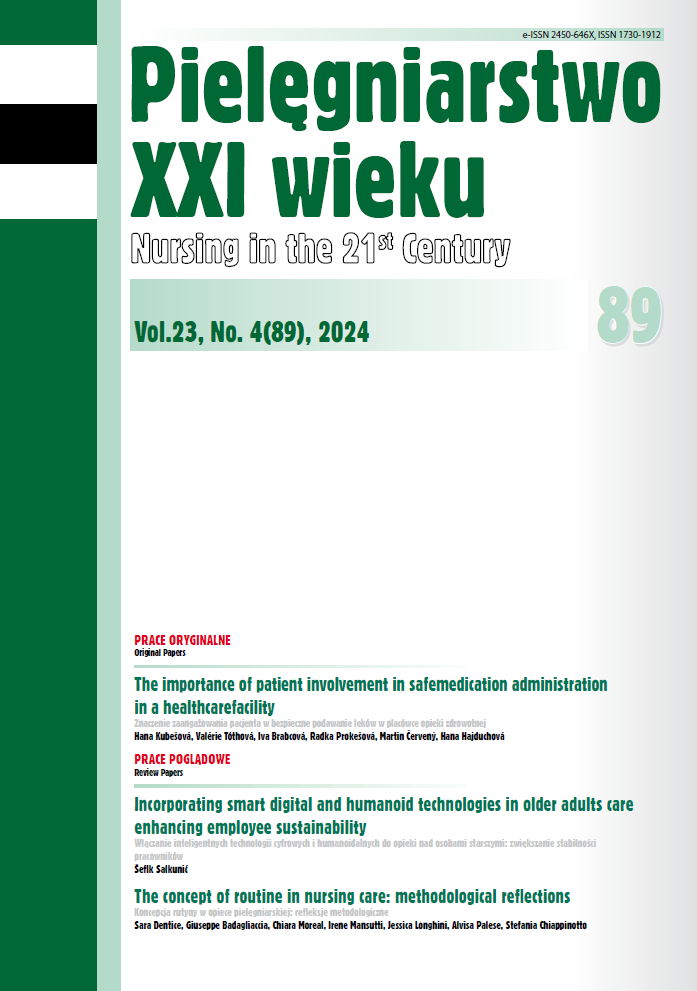Perceptions of bibliotherapy sessions participation: a qualitative focus group study with insider approach
DOI:
https://doi.org/10.12923/pielxxiw-2024-0045Keywords:
bibliotherapy, communication, empowerment, nursingAbstract
Aim. To explore and understand perceptions of participating in bibliotherapy sessions.
Material and methods. In a qualitative focus group study using an insider approach, focus group interviews with eight participants taking part in bibliotherapy sessions in Croatia were conducted. All focus group interviews were recorded, transcribed, and analyzed using inductive thematic analysis.
Results. We identifi ed three themes: (i) resonance and empathy, (ii) personal growth and acceptance, and (iii) bibliotherapy in healthcare. The participants perceived that bibliotherapy demonstrates the power of storytelling to evoke emotions, promote personal growth, create empathetic connections among individuals, and can be implemented in the healthcare setting. The participants had favorable experiences and believed that bibliotherapy is a valuable tool for introducing clinical and developmental concepts, promoting eff ective communication, and supporting the secure exploration of emotions and personal experiences. Texts can eff ectively convey challenging and distressing subjects about the emotional responses experienced by patients regarding diagnosis, treatment, and treatment outcomes.
Conclusions. The participants highlighted the benefi ts of bibliotherapy, suggesting it is benefi cial for individuals across various age groups and medical conditions, from children to elderly patients in long-term care.
References
1. Bilich LL, Deane FP, Phipps AB, et al. Effectiveness of bibliotherapy self‐help for depression with varying levels of telephone helpline support. Clinical Psychology & Psychotherapy: an International Journal of Theory & Practice. 2008;15(2):61-74.
2. Roberts N. Acceptability of bibliotherapy for patients with cancer: A qualitative, descriptive study. Oncology Nursing Forum. 2016;43(5):588-594.
3. Janavičienė D. Bibliotherapy process and type analysis: review of possibilities to use it in the library. Tiltai. 2010;4:119-132.
4. Wells E, Velasquez D, Hutchinson A, et al. Psycho-oncology bibliotherapy program for improving the emotional wellbeing of people undergoing cancer treatment: Literature review and preliminary findings. Journal of the Australian Library and Information Association. 2023;72(3):270-293.
5. Rocha RCNP, Pereira ER, Silva RMCRA, et al. The bibliotherapy in the humanization of care: contributions to nursing practice. International Archives of Medicine. 2016; 274(9):1-7. doi: 10.3823/2145.
6. Ryu YM, Yi M. The effects of bibliotherapy in nursing students. Research Journal of Pharmacy and Technology. 2017;10(7):2379-2386.
7. Jenifer J. Assess the effectiveness of bibliotherapy on exam anxiety reduction among b.sc. nursing students. International Journal of Psychiatric Nursing. 2019;6(1):9-12.
8. Aslam A, Amna S. Bibliotherapy: a potential tool for stress reduction in nurses;
an interventional study. Journal of Nurses and Midwives Pakistan. 2021;1(2):58-63.
9. Astarani K, Richard SD. Bibliotherapy strategy: experimental study to reduce hospitalization stress in pre-school children. STRADA Jurnal. 2020;9(2):917-925.
10. Dimitrijević SM, Marić S, Bacetić T. A book as a medicine implementation of bibliotherapy in nursing home for the adult and elderly people in Zabucje. Korak biblioteke: časopis za kulturu i bibliotečko-informacionu delatnost. 2022;7:183-207.
11. Ryan Malibiran M, Kim Amer PhD R. Bibliotherapy. Clinical Journal of Oncology Nursing. 2018;22(4):377-380.
12. Bašić I. Biblioterapija i poetska terapija: priručnik za početnike. Zagreb: Balans centar. 2011.
13. Silaj K. Biblioterapija i poetska terapija: priručnik za početnike/Ivana Bašić. Zagreb: Školska knjiga, 2021. Glasilo Zagrebačkoga knjižničarskog društva. 2022;20(37):53-57.
14. Aburn GE, Gott M, Hoare K. Experiences of an insider researcher–interviewing your own colleagues. Nurse Researcher. 2021;29(3):22-28.
15. Cheng FK. Using focus groups with outsider and insider approaches: Preparation, process, and reflections: SAGE Publications, Ltd.; 2014.
16. Nakou P. Reflections On ‘Insider Focus Groups’. SENTIO. 2022:126.
17. Tong A, Sainsbury P, Craig J. Consolidated criteria for reporting qualitative research (COREQ): a 32-item checklist for interviews and focus groups. International Journal for Quality in Health Care. 2007;19(6):349-357.
18. Low J, Saks M, Allsop J. Unstructured and semi structured interviews in health research. London: Sage Publications. 2019:123-141.
19. Braun V, Clarke V. Contextualism: thematic analysis - a practical guide. London: Sage Publications; 2022.
20. Lincoln YS, Guba EG, Pilotta J. Naturalistic inquiry. Newbury Park: Cal Sage; 1985.
21. World Medical Association. World Medical Association Declaration of Helsinki: ethical principles for medical research involving human subjects. JAMA. 2013;310(20):2191-2194.
22. Cardy P, Corner J, Evans J, et al. Worried sick: the emotional impact of cancer. Macmillan: Cancer Support London, 2006.
23. Galway K, Black A, Cantwell MM, et al. Psychosocial interventions to improve quality of life and emotional wellbeing for recently diagnosed cancer patients. Cochrane Database of Systematic Reviews. 2012;11(11):CD007064.
24. Angell KL, Kreshka MA, McCoy R, et al. Psychosocial intervention for rural women with breast cancer: the Sierra Stanford partnership. Journal of General Internal Medicine. 2003;18:499-507.
25. Körner A, Roberts N, Steele RJ, et al. A randomized controlled trial assessing the efficacy of a self-administered psycho-educational intervention for patients with cancer. Patient Education and Counseling. 2019;102(4):735-741.
26. Krebber A-MH, Jansen F, Witte B, et al. Stepped care targeting psychological distress in head and neck cancer and lung cancer patients: a randomized, controlled trial. Annals of Oncology. 2016;27(9):1754-1760.
27. Pidjadee C, Soh KL, Attharos T, et al. The effect of infection prevention and control programme for childcare workers in daycare centres: a systematic review. Journal of Pediatric Nursing. 2024;79:116-125.
28. Semple CJ, Dunwoody L, Kernohan WG, et al. Development and evaluation of a problem-focused psychosocial intervention for patients with head and neck cancer. Supportive Care in Cancer. 2009;17:379-388.
29. Yu T-Y, Wu T-J, Jou S-T, et al. Examining the emotional healing process through bibliotherapy in adolescents with cancer: a qualitative descriptive study. European Journal of Oncology Nursing. 2024;71:102653.
Downloads
Published
Issue
Section
License
Copyright (c) 2025 Authors

This work is licensed under a Creative Commons Attribution 4.0 International License.




